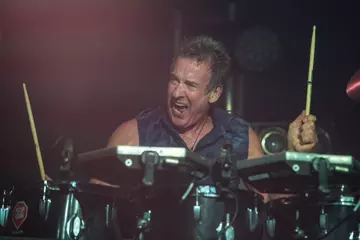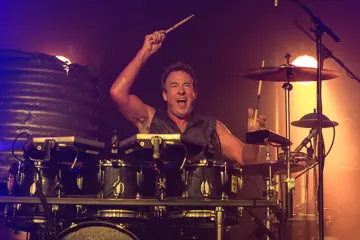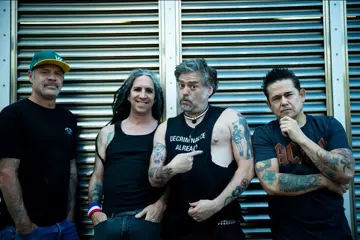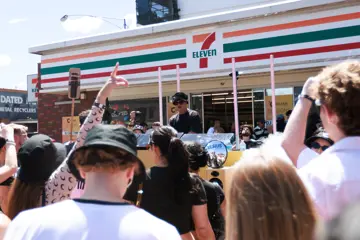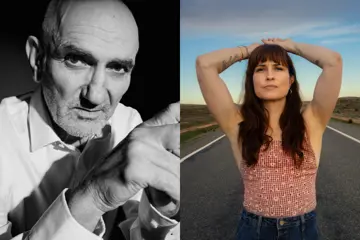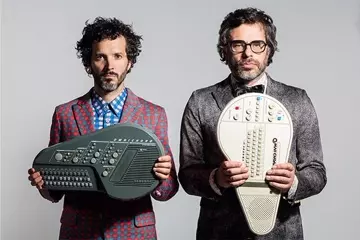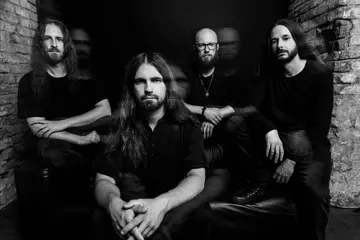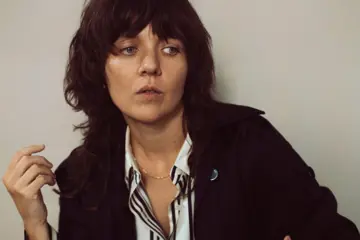The 85th Academy Award nominees were read out, overnight - by the from-hell combination of Seth MacFarlane and Emma Stone - and three Australian actors have earned Oscar nominations. Hugh Jackman, long considered a lock for the Best Actor category, was nominated for his saliva-flying song-and-torture turn in Les Misérables. Jackman has served as Oscar host, but this marks his first nomination. Naomi Watts and Jacki Weaver both received their second nomination; Watts for her leading turn in the tsunami-swept 'inspirational' weepie The Impossible, and Weaver - furthering an astonishing late-career renaissance that makes memories of her as Mrs. Derryn Hinch seems eternities ago - following her Animal Kingdom nomination in 2011 with a nod for her turn in David O. Russell's idiosyncratic comedy Silver Linings Playbook. American Helen Hunt has earnt an acting nod for The Sessions, directed by former 'Stralia-based director Ben Lewin - his craft having been honed here on such TV flotsam as Rafferty's Rules and SeaChange.
As always, though, the Oscar nominations were a mix of expected, slightly confusing, and often embarrassing. Trying to make sense of Academy 'logic' is never a good idea, but let us run through the major award categories.
Best Motion Picture of the Year:
Amour
Argo
Beasts of the Southern Wild
Django Unchained
Les Misérables
Life of Pi
Lincoln
Silver Linings Playbook
Zero Dark Thirty
The throwing open of the Best Picture gates - no longer subject to set numbers of nominees; there are now, instead, between 5 and 10 nominees every year - was, in the minds of many, a concession to the blockbusters that drive the multinational-studio machine. Instead, this year, the extra space, here, has seemingly allowed two 'small' darlings - Michael Haneke's Amour, and Benh Zeitlin's Beasts Of The Southern Wild - to sneak into the category. There are, otherwise, no surprises, but let's step away from category-predicting punditry and weigh up, for a second, whether these are actually good movies. In the case of Amour, Django Unchained, and Silver Linings Playbook - all auteurist works of cinematic vision; or, to put it simply, real films by real filmmakers - the answer is of course. Zero Dark Thirty is an impressive piece of fierce, exacting cinema, but it's also a glorified procedural; and even though it explicitly doesn't contain this message in its text, you can't help but wonder if its Film-of-the-Year status in the US isn't making it a totemic artwork of national 'closure'. Lincoln has its Oscar-bait flaws - the heroic, swelling score, the nationalist flagwaving, the signposting characterisation - but it's a sobre history lesson bathed in beautiful cinematic blacks. Les Misérables is an impressive attempt at making 'realist' a cheeseball Broadway show, for what that's worth. Which leads us to the three films that should be no man's idea of a Best Picture: Life Of Pi, a storybook spectacle that looks nice, but certainly never even hints at greatness; Beasts Of The Southern Wild, a clamouring piece of over-the-top feelgood that sputters all those times it attempts to soar; and Argo, a stylistically-incoherent mish-mash of movie-magic myth-making, spy-movie sting, and corridors-of-power bro-down. Nine nominations, and, yet, Paul Thomas Anderson's meticulous The Master couldn't find a gig. Oh, well, at least there's no 2013 equivalent to Crash or The Blind Side.
Best Performance by an Actor in a Leading Role:
Bradley Cooper for Silver Linings Playbook
Daniel Day-Lewis for Lincoln
Hugh Jackman for Les Misérables
Joaquin Phoenix for The Master
Denzel Washington for Flight
Don't miss a beat with our FREE daily newsletter
If you're a gambling man, put the house on Day-Lewis. His performance elevates Lincoln to places Señor Spielbergo was never quite going to take it; and, as entrancing as Phoenix's bodily contortions and lacerating self-destruction were in The Master, he was also a fairly hateful figure, which never sails in a populist event like this. Jackman went through a range of looks (so gaunt and bearded and beaten-down in the beginning) and sang his little saliva-spraying heart out; Denzel went on Denzel autopilot as, um, pilot; and Bradley Cooper submitted the year's best turn by a former cast member of Alias. But, seriously, can any of these humans hold a candle to what Denis Lavant did in Holy Motors? Of course, if I had a vote, I'd be casting it for Yiannis Papadopolous' semen-eating turn in (almost every frame of) Boy Eating The Bird's Food. Which is, of course, why I don't have a vote. I'm also not 75 years old.
Best Performance by an Actress in a Leading Role:
Jessica Chastain for Zero Dark Thirty
Jennifer Lawrence for Silver Linings Playbook
Emmanuelle Riva for Amour
Quvenzhané Wallis for Beasts of the Southern Wild
Naomi Watts for The Impossible
Oscar history was made on either end of this category: Riva, at 85, the oldest ever acting nominee; Wallis, at 9, the youngest. Both would have to be considered long-shots in the category; although Best Actress feels like the kind of place were stunt-voters could get their kicks. Lawrence, too, seems less-than-likely to win for her Silver Linings Playbook turn. Which means the winner is likely to be Chastain and Watts, who were the dramatic driving force and emotional barometer for their pictures. Complaining about who wasn't nominated seems like a fool's lament; that the Academy didn't honour the amazingness of Émilie Dequenne in Our Children or Marija Pikic in Children Of Sarajevo isn't a miscarriage-of-justice, because the Oscars are no man's measurement of actual cinematic virtue. But, that said, Marion Cotillard in Rust & Bone sure would've looked good (y'know, in other ways) nominated here; the endlessly-impressive French thesp taking what seems like an Oscar bait turn and instilling it with a sense of genuine life and inner turmoil, even if it's hard not to stare at her digitally-excised legs in every scene.
Best Performance by an Actor in a Supporting Role:
Alan Arkin for Argo
Robert De Niro for Silver Linings Playbook
Philip Seymour Hoffman for The Master
Tommy Lee Jones for Lincoln
Christoph Waltz for Django Unchained
Philip Seymour Hoffman is all kinds of amazing in The Master; he, effectively, the anti-Anthony Hopkins, using his theatre-training and theatrical sensibilities to serve the story and honour narrative truths, not draw attention to himself. Also, with his salt-and-(cracked red?)-pepper stubble and twinkling, mischievous eyes, he's also seriously seductive; which is what you want from your cult leader. Waltz has been gifted with two of the most memorable roles in recent American cinema from Quentin Tarantino, and he's not only lived up to them, but elevated them moreso; he feels like he should be an awards-show staple for years to come. Seven-time nominee Bobby D washes off decades of cheque-cashing, Fockers franchise, heart-sinking stink with an actual acting performance in an actual meaningful film; a narrative that will surely pick up steam as the ceremony grows closer. After missing on noms with The Three Burials Of Melquiades Estrada and No Country For Old Men, Tommy Lee follows his In The Valley Of Elah nomination with another for Lincoln; a role which, really, asks little from him other than being old and crotchety. Arkin's nomination is embarrassing; even moreso than for his facsimile performance in Little Miss Sunshine. Sadly, Matthew McConaughey's turn from Magic Mike couldn't rustle up enough votes; let us be satisfied the actor finally made good on his Dazed & Confused promise with a run of memorable 2012 turns.
Best Performance by an Actress in a Supporting Role:
Amy Adams for The Master
Sally Field for Lincoln
Anne Hathaway for Les Misérables
Helen Hunt for The Sessions
Jacki Weaver for Silver Linings Playbook
Having already waxed critical pirouettes over Hathaway's performance in Les Misérables, I need not say much more about her Falconetti buzzcut and salty tears, except that she'll likely win. Adams was thoroughly brilliant in The Master; her Lady MacBeth handjob ranks as one of the years great cinematic moments; her clear-eyed performance marked a fine counter to her just-as-pleasing, dead-eyed turn in the Walter Salles' Oscars-maligned adaptation of On The Road. Weaver took to Russell's conceptually-silly sensibility with both comic and caustic aplomb; Hunt was perfectly cast as the smiling-and-benevolent-yet-trying-not-to-come-undone sex therapist in The Sessions (which missed out on nominations elsewhere; a surprise given John Hawkes spent half the film lying in an Iron Lung, which seems like Oscar-bait paydirt); and Field had many moments of teeth-gnashing, grieving, wailing, shouting, and laying-down-emotional-challenges-to-the-leading-man in Lincoln, which she did ably, if not transcendently. Of course, literally half the ensemble from Bertrand Bonello's belle époque brothel, The House Of Tolerance, did work way beyond much of this; but let us not hold fast to alternate-world dreams in the face of the Oscar's cold, closed reality.
Best Achievement in Directing:
Michael Haneke for Amour
Ang Lee for Life of Pi
David O. Russell for Silver Linings Playbook
Steven Spielberg for Lincoln
Benh Zeitlin for Beasts of the Southern Wild
The presence of Haneke is heartening; the austere Austrian has long been one of cinema's most exacting artists, with a run of masterworks - Benny's Video, The Piano Teacher, and Caché chief among them - and a devotion to the medium. Even 'minor' Haneke - like, say, Code Unknown - features moments of film formalism above and beyond anything any of the other nominees can dream of. The absence of Paul Thomas Anderson is, considering he was surely in the conversation, pretty ridiculous; The Master's caustic portrait of men-in-mid-20th-century-America being the finest directed American film in aeons; probably since There Will Be Blood, which surely says something. Señor Spielbergo is obviously a glorified Hollywood hack, but Lincoln at least looked handsome, in its glowering shadows and panoply of tall hats; and if it washes away the hideousness of Amistad from the collective memory, well, it achieved something. Lee may've made the best-looking 3D film ever, but, in my mind, that's faint praise. Russell is a really interesting filmmaker, but that's almost never to do with how his films look, or the way he frames images, or things he does visually; there are countless examples of better-looking films that could be called upon (just for laughs: Julia Loktev's The Loneliest Planet, for a really obvious one). One of those would not be Beasts Of The Southern Wild, which, whilst hailed as a 'visionary' work dredged from the imagination of its 20-something creator, actually looked a lot more like an action movie than a piece of art cinema; its reputation running contrary to the fact that its actual execution was often poor.
Best Writing, Screenplay Written Directly for the Screen:
Amour
Django Unchained
Flight
Moonrise Kingdom
Zero Dark Thirty
Given Moonrise Kingdom was Film Carew's #1 film of 2012, maybe some feel I should be outraged it received but one scant nomination, but wondering why Wes Anderson hasn't won any Oscars feels, to me, like wondering why Belle & Sebastian hasn't won any Grammys. Sometimes the Best Screenplay category feels like like the place where the best films naturally pool (last year Asghar Farhadi's astonishing A Separation landed here), and Amour, Django Unchained, and Zero Dark Thirty are at the pinnacle of this Oscar field. But the idea that Flight is anyone's idea of best writing blows my mind; the writing is definitely not what makes that film anything approaching interesting.
Best Writing, Screenplay Based on Material Previously Produced or Published:
Argo
Beasts of the Southern Wild
Life of Pi
Lincoln
Silver Linings Playbook
It's pretty funny Beasts Of The Southern Wild is nominated here, given that it was only tenuously related to the stageplay on which it was based, and its 'writing' came often through improvisatory rehearsals with its non-professional actors. Lincoln's vast ensemble of characters and dense political intrigue make it most likely to win this thing, but, man, not even a token nod for Tom Tykwer and the Wachowskis' crazy, if-possibly-failed attempt to wrangle David Mitchell's generation/genre-spanning leviathan, Cloud Atlas, into some kind of coherent screenplay?
Best Animated Feature Film of the Year:
Brave
Frankenweenie
ParaNorman
The Pirates! Band of Misfits
Wreck-It Ralph
This category is the Oscars' most recent addition; founded in 2001 as a thankyou to Pixar for making Hollywood shit-tons of cash. A dozen years later, and, um, is it too late to retract this category? Brave, Frankenweenie, and The Pirates! were all huge disappointments; and seem to be nominated for the simple fact that they're there. The annual lack of any non-Miyazaki animé shows how constantly clueless this category is; I have no idea if Mamoru Hosoda's Wolf Children was eligible, but, man, is it lightyears beyond anything herein. Ignacio Ferreras' Wrinkles and Joann Sfar's The Rabbi's Cat, too. When you're the least-credible category at the frickin' Oscars, this is a sad indictment of your right to exist.
Best Foreign Language Film of the Year:
Amour
War Witch
No
A Royal Affair
Kon-Tiki
The lack of Holy Motors suggests that there are very few Oscars voters who actually love cinema; all that it means, can be, and is; Leos Carax's visionary picture imagining the world as cinema in a way that your regular Prestige Picture would never dream. Amour will clearly win; ahead of A Royal Affair's standard-issue bodice-rippin', Kon-Tiki's empty 'inspiratonalism', and War Witch's message-movie-ism. But god bless the presence of No. Sure, it marks Pablo Larraín's turn towards populism, but seeing the guy who made the caustic, claustrophobic Post-Mortem - one of cinema's most searing portraits of complicity and national guilt - given Hollywood notice is some kind of heartening. The fact that foreign-language cinema is some weird kind of ghetto at the Oscars should, in so many ways, invalidate the entire enterprise; but this is another story; a tale of empirical thinking we'll skewer another time.
Best Documentary:
5 Broken Cameras
The Gatekeepers
How to Survive a Plague
The Invisible War
Searching for Sugar Man
It wouldn't be the Oscars without at least some skerrick of Jewish politics at play; but the tired parade of holocaust pictures past has given way to more conflicted visions of the Israeli occupation of Palestine; 5 Broken Cameras a piece of citizen's cinema from on the ground by the wall; The Gatekeepers a a fascinating, conflicted portrait of those charged with aiding Israel's hoped-for state-of-calm façade via secret-service chicanery and on-message manoeuvring. More good news: How To Survive A Plague, The Invisible War, and Searching For Sugar Man are all fabulous films; and the fact that ace provocateur Kirby Dick - in so many ways, a scourge of the establishment - has been honoured for his fucking-shit-up work with The Invisible War is pleasing. I could lament the absence of Michael Glawogger and Whores' Glory, but, lamenting what the Oscars failed to do feels like giving too much credence to what they are. Which is: a piece of back-patting, TV-seizing marketing that too often celebrates what should be condemned.

